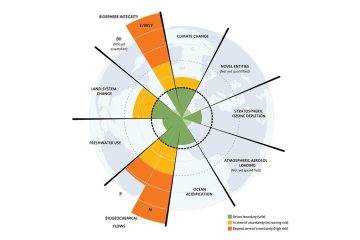Embark on a celestial voyage beyond the confines of Earth as we delve into the fascinating realm of planetary ecology. Imagine a universe where intricate ecosystems thrive on distant worlds, each a masterpiece of interconnected harmony. Join us on this exploration of how life, in all its diverse forms, adapts and flourishes amidst the cosmic wonders of our vast universe. From the barren landscapes of Mars to the icy moons of Jupiter, let us unravel the mysteries of planetary ecology together.
Table of Contents
- Exploring the Interconnectedness of Planetary Ecosystems
- Preserving Biodiversity Through Sustainable Practices
- Harnessing Technology for Environmental Conservation
- Empowering Communities for Global Ecological Balance
- Q&A
- The Conclusion

Exploring the Interconnectedness of Planetary Ecosystems
In the vast tapestry of our universe, planets are not isolated entities but rather intricate components of a larger ecological system. Each planet, with its unique blend of atmosphere, landforms, and life forms, plays a crucial role in this interconnected web of ecosystems. From the swirling storms of gas giants to the barren landscapes of desolate planets, the diversity of planetary ecosystems is a testament to the wonders of the cosmos.
**** unveils the hidden relationships between celestial bodies, shedding light on how changes in one ecosystem can reverberate across the galaxy. Through the lens of planetary ecology, we gain a deeper appreciation for the delicate balance that sustains life on Earth and beyond. Join us on a journey through the cosmic symphony of interconnectedness, where each planet’s story is but a chapter in the grand saga of the universe.
Preserving Biodiversity Through Sustainable Practices
Biodiversity plays a crucial role in maintaining the delicate balance of ecosystems worldwide. By embracing sustainable practices, we can actively contribute to the preservation of our planet’s rich variety of life forms and habitats. Through conscious efforts such as reducing carbon footprint, protecting endangered species, and promoting organic farming, we can make a significant impact on safeguarding biodiversity for future generations.
Embracing sustainable practices not only benefits the environment but also promotes a healthier lifestyle for all living beings. By choosing to support eco-friendly initiatives, individuals and organizations alike can create a positive ripple effect that extends far beyond their immediate surroundings. Together, we have the power to cultivate a world where biodiversity thrives, ensuring a harmonious coexistence between humans and nature for years to come.

Harnessing Technology for Environmental Conservation
In today’s fast-paced digital age, the synergy between technology and environmental conservation has become more crucial than ever before. Embracing innovative tools and solutions is paramount to safeguarding our planet for future generations. From satellite imaging to artificial intelligence, the possibilities are endless when it comes to leveraging tech for the greater good of our ecosystem.
One way technology is making waves in environmental protection is through the development of smart sensors that can detect pollution levels in real-time. These sensors help in monitoring air, water, and soil quality, providing valuable data for proactive conservation efforts. Additionally, the rise of blockchain technology has revolutionized transparency in environmental initiatives, enabling stakeholders to track and verify sustainability practices effectively. By harnessing the power of technology, we can pave the way for a more sustainable and harmonious relationship with our planet.
Empowering Communities for Global Ecological Balance
Enhancing biodiversity is crucial for the sustenance of our ecosystems. By promoting sustainable practices and conservation efforts, we can preserve the delicate balance of nature. Reconnecting with our environment allows us to appreciate the interconnectedness of all living beings, fostering a sense of stewardship for our planet’s future.
Collaboration among diverse cultures and communities is key to achieving a harmonious coexistence with nature. By sharing knowledge, resources, and experiences, we can collectively work towards restoring and protecting our planet. Together, we have the power to make a positive impact on the global ecological landscape, creating a more resilient and sustainable future for generations to come.
Q&A
**Q&A: Exploring the Wonders of Planetary Ecology**
Q: What is planetary ecology, and why is it important?
A: Planetary ecology is the study of the interconnectedness of living organisms and their environments on a global scale. It focuses on understanding how ecosystems function and how human activities impact the health of our planet. It is crucial because it provides insights into maintaining a sustainable balance between nature and human life.
Q: How does planetary ecology differ from traditional ecology?
A: While traditional ecology focuses on smaller, localized ecosystems, planetary ecology takes a broader perspective by examining interactions and processes that occur at a global level. It considers how environmental changes in one part of the world can have far-reaching effects on ecosystems worldwide.
Q: What are some pressing issues in planetary ecology today?
A: Currently, issues such as climate change, deforestation, loss of biodiversity, pollution, and habitat destruction are major concerns in planetary ecology. These challenges require urgent attention and collective action to protect our planet’s delicate balance and ensure a sustainable future for all living beings.
Q: How can individuals contribute to planetary ecology efforts?
A: Individuals can make a significant impact by adopting sustainable practices in their daily lives, such as reducing waste, conserving energy, supporting conservation initiatives, and advocating for environmentally-friendly policies. By being mindful of our actions, we can each play a part in preserving the health of our planet for future generations.
Q: What role does technology play in advancing planetary ecology research?
A: Technology plays a crucial role in planetary ecology research by enabling scientists to collect and analyze vast amounts of data, monitor environmental changes in real-time, model ecosystems, and develop innovative solutions to environmental challenges. From satellite imaging to AI-powered analysis, technology empowers researchers to better understand and protect our planet.
The Conclusion
As we gaze up at the night sky and ponder the mysteries of the universe, it becomes apparent that our planet, Earth, is but a tiny speck in the vast cosmos. Yet, within this seemingly insignificant realm, intricate ecosystems thrive, interconnected in a delicate dance of life. The study of planetary ecology not only unveils the wonders of our own world but also offers insights into how we can better protect and preserve it for future generations. Let us continue to marvel at the wonders of nature, nurture our planet with reverence, and strive to be stewards of this extraordinary living system we call home. Together, let us embark on a journey of discovery, appreciation, and sustainable coexistence with all the diverse forms of life that share this magnificent blue orb with us. May we tread lightly, learn humbly, and act wisely to safeguard the planetary ecology that sustains us all. Thank you for joining us on this exploration of the interconnectedness of life on Earth and beyond.



0 Comments